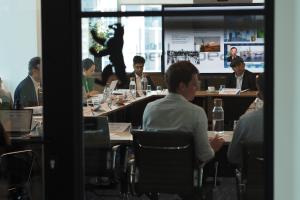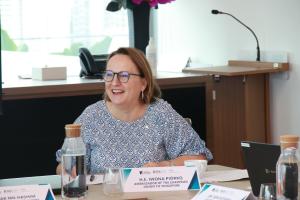On the 9th and 10th of October 2024, the Konrad Adenauer Stiftung Regional Political Dialogue Asia hosted the event for “The Emergence of Greater Asia in Energy and Climate – Geopolitical Trends and Implications for Asia-Europe Collaboration”.
Experts in the fields of international relations, public policy, energy, and sustainable development assembled at the Konrad Adenauer Stiftung office in Singapore for the two-day workshop, organised as a collaboration between the German Institute for International and Security Affairs (SWP), the S. Rajaratnam School of International Studies (RSIS), and the KAS office in Singapore.
The workshop primarily explored the major trends and transformations in energy across the Greater Asia region and how these trends intersect with areas such as security and trade. One particular focus of the workshop was the role that the EU and Germany must play in this transformation.
Following the first two panel discussions, which centred on the bigger picture of Greater Asia’s energy transition geopolitics and the energy, climate, and security nexus, panellists were treated to a keynote debate between Abdullah Al Abri of the SOHAR Port and Freezone Authority and Ken Koyama of Japan’s Institute of Energy Economics. This discussion melded the two poles of Greater Asia’s energy transition discourse. Despite this, both experts were able to find common ground on many issues regarding the interaction between the private and public sectors as well as the role of logistics and transportation infrastructure in the future of Greater Asia.
During the first foresight session, attendees challenged their preexisting assumptions about Greater Asia’s energy transition in the leadup to 2035, determining them to be either substantiated, unsubstantiated or caveated. The day ended with one final panel on the Energy transition as a strategic tool for development.
Day two began with a panel on the political economy of Climate and Technology Governance. Later, the Konrad Adenauer Stiftung welcomed H.E. Iwona Piórko, the European Union Ambassador to Singapore, to the workshop. She joined Sabar Md Hashim, the former Special Officer of the Malaysian Ministry of Economy as well as Hageng Nugroho, a member of the Executive Office of the President of Indonesia for a panel discussion on intra- and interregional energy collaboration in Southeast Asia. In essence, the panel, followed by a lengthy Q&A session, included discussions about the difficulties attempting to recreate the EU model in ASEAN, the realities of Southeast Asia’s rising energy demand, the importance of climate action, and whether ASEAN should be complimented with a specialised regional agency in matters regarding energy cooperation.




